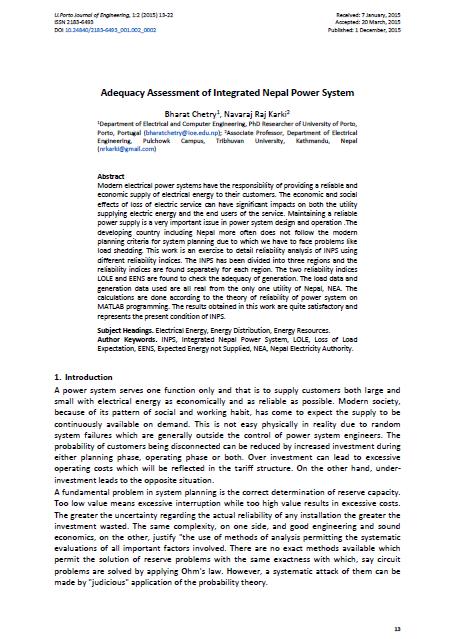Adequacy Assessment of Integrated Nepal Power System
Main Article Content
Abstract
Modern electrical power systems have the responsibility of providing a reliable and economic supply of electrical energy to their customers. The economic and social effects of loss of electric service can have significant impacts on both the utility supplying electric energy and the end users of the service. Maintaining a reliable power supply is a very important issue in power system design and operation .The developing country including Nepal more often does not follow the modern planning criteria for system planning due to which we have to face problems like load shedding. This work is an exercise to detail reliability analysis of INPS using different reliability indices. The INPS has been divided into three regions and the reliability indices are found separately for each region. The two reliability indices LOLE and EENS are found to check the adequacy of generation. The load data and generation data used are all real from the only one utility of Nepal, NEA. The calculations are done according to the theory of reliability of power system on MATLAB programming. The results obtained in this work are quite satisfactory and represents the present condition of INPS.
Downloads
Article Details
Authors who publish with this journal agree to the following terms:
- Authors retain copyright and grant the journal right of first publication with the work simultaneously licensed under a Creative Commons Attribution License that allows others to share the work with an acknowledgement of the work's authorship and initial publication in this journal.
- Authors grant the journal the rights to provide the article in all forms and media so the article can be used on the latest technology even after publication and ensure its long-term preservation.
- Authors are able to enter into separate, additional contractual arrangements for the non-exclusive distribution of the journal's published version of the work (e.g., post it to an institutional repository or publish it in a book), with an acknowledgement of its initial publication in this journal.
- Authors are permitted and encouraged to post their work online (e.g., in institutional repositories or on their website) prior to and during the submission process, as it can lead to productive exchanges, as well as earlier and greater citation of published work (See The Effect of Open Access).

